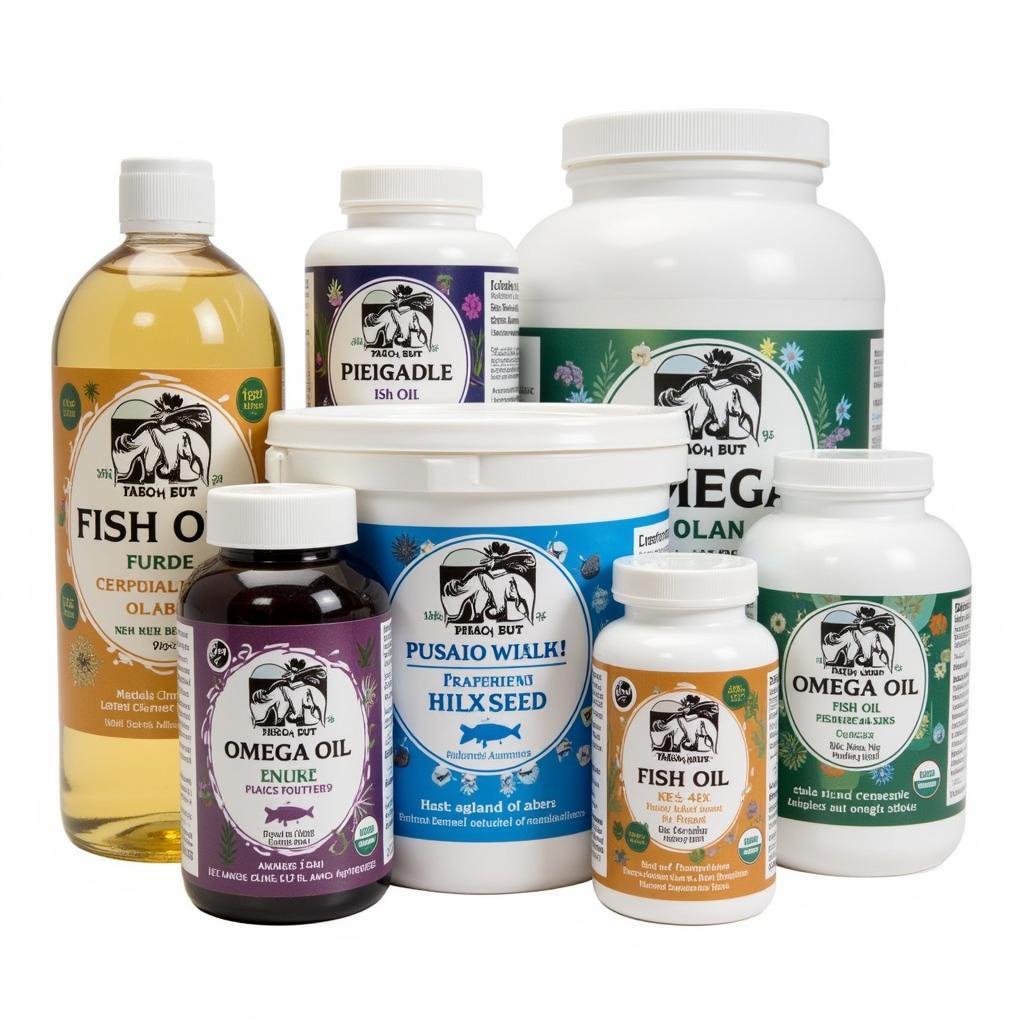Omega Oil For Horses has become increasingly popular among horse owners seeking to enhance their equine companions’ health and well-being. This guide will delve into the benefits, types, and usage of omega oil for horses, providing you with the knowledge to make informed decisions about your horse’s nutritional needs. We’ll explore the science behind omega oils and how they can contribute to a healthier, happier horse.
Understanding the Benefits of Omega Oil for Horses
Omega fatty acids are essential nutrients that play a crucial role in maintaining various bodily functions in horses. They are categorized into omega-3 and omega-6 fatty acids, both of which offer distinct advantages. Omega-3s are known for their anti-inflammatory properties, supporting joint health, skin and coat condition, and reproductive health. omega 3 oil for horses can be particularly beneficial for horses with inflammatory conditions like arthritis. Omega-6s, on the other hand, are important for cell growth, immune function, and hormone production. Finding the right balance between these two types of fatty acids is crucial for optimizing your horse’s overall health.
 Benefits of Omega Oil for Horses
Benefits of Omega Oil for Horses
What are the specific advantages of omega oil for horses?
- Improved Skin and Coat Health: Omega oils can help maintain a healthy, glossy coat, reduce itching and dryness, and promote healing of skin irritations.
- Enhanced Joint Health and Mobility: The anti-inflammatory effects of omega-3s can alleviate joint pain and stiffness, improving mobility and overall comfort.
- Boosting the Immune System: Omega oils can strengthen the immune system, making horses more resistant to infections and diseases.
- Supporting Reproductive Health: Omega-3s are essential for healthy reproductive function in both mares and stallions.
- Improved Hoof Quality: Omega oils can contribute to stronger, healthier hooves, reducing the risk of cracks and other hoof problems.
Different Types of Omega Oil for Horses
There are various sources of omega oil for horses, including flaxseed oil, fish oil, and cocosoya oil for horses. Each type has a different ratio of omega-3 and omega-6 fatty acids, so it’s crucial to choose the one that best suits your horse’s specific needs. For instance, flaxseed oil is a rich source of omega-3s, while corn oil primarily provides omega-6s. Your veterinarian can help determine the ideal type and dosage of omega oil for your horse based on its age, breed, activity level, and overall health status.
 Different Types of Omega Oil Supplements for Horses
Different Types of Omega Oil Supplements for Horses
How do I choose the right omega oil for my horse?
Consulting with your veterinarian is the best way to determine the most appropriate type and dosage of omega oil for your horse. They can assess your horse’s individual needs and recommend a suitable supplement.
Incorporating Omega Oil into Your Horse’s Diet
Adding omega oil to your horse’s diet is a straightforward process. Most omega oil supplements are available in liquid form, which can be easily added to your horse’s feed. It’s important to start with a low dose and gradually increase it to the recommended amount to avoid digestive upset. Always follow the manufacturer’s instructions and consult with your veterinarian if you have any concerns. Remember, providing oil horses can greatly contribute to their well-being.
Conclusion
Omega oil for horses offers a multitude of benefits, contributing to improved skin and coat health, enhanced joint mobility, and a stronger immune system. By understanding the different types of omega oils and their specific advantages, you can make informed decisions about your horse’s nutritional requirements. Always consult with your veterinarian before introducing any new supplements to your horse’s diet to ensure its safety and efficacy. Implementing omega oil can be a valuable addition to your horse’s overall care, promoting its well-being and longevity.
FAQ
- What are the signs of omega-3 deficiency in horses?
- Can I give my horse too much omega oil?
- What is the best way to store omega oil?
- How long does it take to see results from omega oil supplementation?
- Are there any alternatives to omega oil for horses?
- Can I use human omega-3 supplements for my horse?
- Is omega oil suitable for all breeds of horses?
You can also learn more about the benefits of corn oil and horses and horse corn oil on our website.
For further assistance, please contact us at Phone: 0772127271, Email: [email protected] or visit our address: QGM2+WX2, Vị Trung, Vị Thuỷ, Hậu Giang, Việt Nam. We have a 24/7 customer service team.